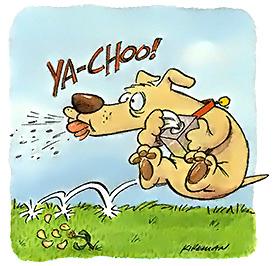
Are Seasonal Allergies bothering your pet and keeping you awake?
From Sherry (Lilee’s mom)
I was unable to sleep very well for the last several nights as Lilee’s licking and scratching has gradually become worse. (Lilee is our beautiful, little husky x shepherd x collie? …adopted from the HSKL). I had hoped that she would be ok this year, but it would seem that her seasonal allergies have started even earlier than last fall. So far her skin looks normal so I am hopeful that she’ll only need antihistamines again this year. (Along with her omega fatty acids of course!) Funny, in an interesting way, how Dr. Rick’s allergies have started to bother him at the same time. I know they say that dogs can look like their owners but I have never actually heard of them sharing the same health issues! J
From Dr. Rick (Lilee’s dad)
Environmental or seasonal allergies can affect our pets just like they can affect some humans. The clinical signs however are different. While humans tend to experience sneezing, nasal discharge, sinus congestion and red eyes, our pets will experience inflamed, itchy skin which can lead to severe scratching and licking causing secondary trauma to the affected areas. As the lining of the ear is a more sensitive continuation of the skin, sometimes all we see are inflamed itchy ears leading to ear infections. Unfortunately, you cannot explain to your pet why it is not good to keep scratching and licking.
On a positive note, if you recognize quickly that your pet may be showing signs of allergies and they are seen by their veterinarian, the treatment may be fairly easy and relatively inexpensive. However, if you wait too long, you may need more extensive treatments to help with the trauma caused as well as helping the symptoms to subside or at least become bearable until the environmental factor (usually ragweed in the late summer and fall) has subsided. This normally happens around the end of October.
The 2 main causes of scratching and itching in our pets are allergies and parasites (fleas and mange). As they are treated differently, it is important to distinguish the cause and then treat appropriately. Your veterinarian will help you with this. When it comes to allergies, we treat with supplements such as omega fatty acids to help the skin get into the best shape possible. We also use various antihistamines as pets may respond differently to each one. We may use anti-inflammatories in more severe cases to get control of the itch and give the pet (and the owner) some relief. Finally, there is an immune system modulator called cyclosporine that is occasionally used. Unfortunately although it generally works well, it is quite pricey compared to the other medications.
Lilee is on oral omega fatty acids year round and we are just starting her second type of antihistamine as the one that seemed to work last year was not as effective. We are hoping that is all she needs! Fingers crossed! J

